
François-Marie Arouet, known by his nom de plumeM. de Voltaire, was a French Enlightenment writer, philosopher (philosophe), satirist, and historian. Famous for his wit and his criticism of Christianity and of slavery, Voltaire was an advocate of freedom of speech, freedom of religion, and separation of church and state.

Jean Chapelain was a French poet and critic during the Grand Siècle, best known for his role as an organizer and founding member of the Académie française. Chapelain acquired considerable prestige as a literary critic, but his own major work, an epic poem about Joan of Arc called "La Pucelle," (1656) was lampooned by his contemporary Nicolas Boileau-Despréaux.
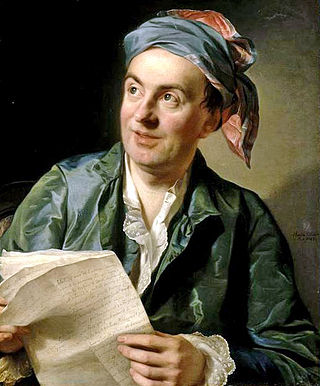
Jean-François Marmontel was a French historian, writer and a member of the Encyclopédistes movement.
This article contains information about the literary events and publications of 1723.

Jean-François de La Harpe was a French playwright, writer and literary critic.

William Henry Ireland (1775–1835) was an English forger of would-be Shakespearean documents and plays. He is less well known as a poet, writer of gothic novels and histories. Although he was apparently christened William-Henry, he was known as Samuel through much of his life, and many sources list his name as Samuel William Henry Ireland.

Jacques Delille was a French poet who came to national prominence with his translation of Virgil’s Georgics and made an international reputation with his didactic poem on gardening. He barely survived the slaughter of the French Revolution and lived for some years outside France, including three years in England. The poems on abstract themes that he published after his return were less well received.

Charles-Jean-François Hénault was a French writer and historian.

Vincenzo Monti was an Italian poet, playwright, translator, and scholar, the greatest interpreter of Italian neoclassicism in all of its various phases. His verse translation of the Iliad is considered one of the greatest of them all, with its iconic opening becoming an extremely recognizable phrase among Italians.
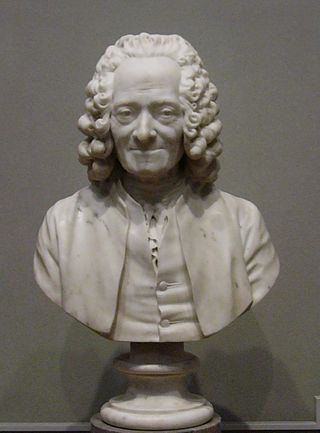
18th-century French literature is French literature written between 1715, the year of the death of King Louis XIV of France, and 1798, the year of the coup d'État of Bonaparte which brought the Consulate to power, concluded the French Revolution, and began the modern era of French history. This century of enormous economic, social, intellectual and political transformation produced two important literary and philosophical movements: during what became known as the Age of Enlightenment, the Philosophes questioned all existing institutions, including the church and state, and applied rationalism and scientific analysis to society; and a very different movement, which emerged in reaction to the first movement; the beginnings of Romanticism, which exalted the role of emotion in art and life.

In Shakespearean scholarship, the Henriad refers to a group of William Shakespeare's history plays depicting the rise of the English kings. It is sometimes used to refer to a group of four plays, but some sources and scholars use the term to refer to eight plays. In the 19th century, Algernon Charles Swinburne used the term to refer to three plays, but that use is not current.
The Château de Challeau refers to two châteaux in the neighbouring communes of Dormelles and Villecerf, near Fontainebleau in the department of Seine et Marne, France.
Nationality words link to articles with information on the nation's poetry or literature.
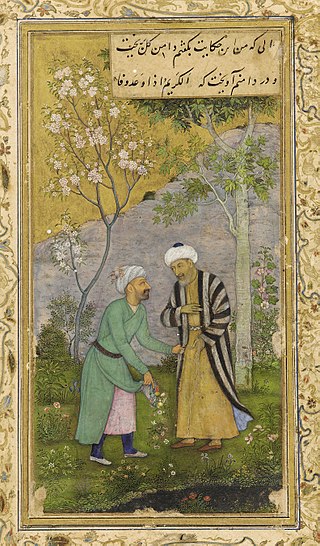
Gulistān, sometimes spelled Golestan, is a landmark of Persian literature, perhaps its single most influential work of prose. Written in 1258 CE, it is one of two major works of the Persian poet Sa'di, considered one of the greatest medieval Persian poets. It is also one of his most popular books, and has proved deeply influential in the West as well as the East. The Gulistan is a collection of poems and stories, just as a rose-garden is a collection of flowers. It is widely quoted as a source of wisdom. The well-known aphorism still frequently repeated in the western world, about being sad because one has no shoes until one meets the man who has no feet "whereupon I thanked Providence for its bounty to myself" is from the Gulistan.
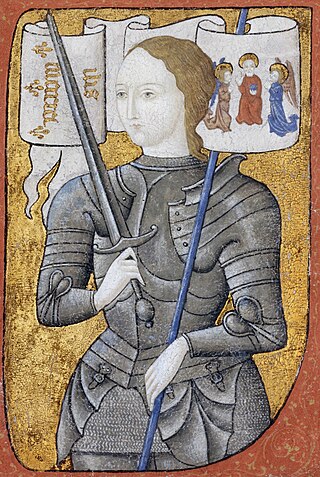
The Maid of Orleans is a satirical poem by Voltaire. It was translated into English by W. H. Ireland.

Don Honoré Armand de Villars, 2nd Duke of Villars, Duke and Peer of France, Prince of Martigues, Grandee of Spain, Knight of the Golden Fleece, Viscount of Melun, Marquis of la Melle, Count of Rochemiley, was a French nobleman, soldier and politician.
Henri-Lambert d'Herbigny, marquis de Thibouville was a notable French writer, wit and bisexual.
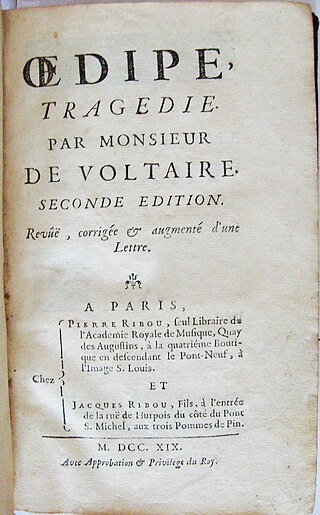
Oedipus is a tragedy by the French dramatist and philosopher Voltaire that was first performed in 1718. It was his first play and the first literary work for which he used the pen-name Voltaire.
















